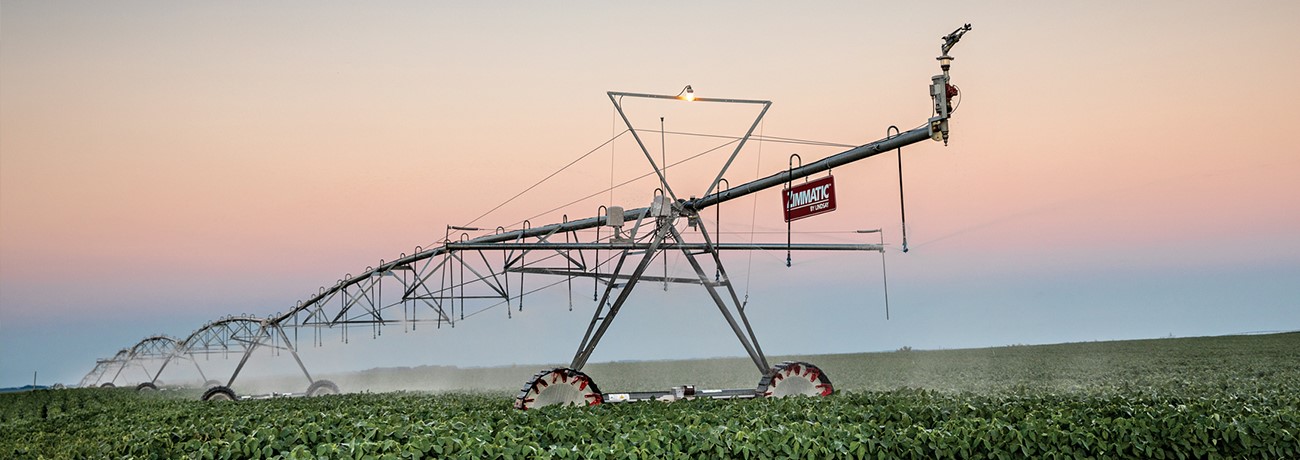Zimmatic Blog
Irrigation to Transform Sandy Soils of Brazil into Green Landscapes
Sep 20, 2021

Brazil is the world’s largest beef exporter by volume. It’s no surprise this major cattle-producing country is focusing on sustainability.
Antonio Ricardo Sechi, owner of Agro Passion, spearheaded an irrigation project to turn the sandy soils of his Cantinho do Céu farm in Brazil into green grazing pastures.
The project was guided by PhD. Fernando Tangerino, a specialist in irrigated agriculture from Sao Paulo State University. According to Tangerino, irrigation will transform the degraded pastures into productive land for growing grain and cattle. “This region has 85% sandy soils, requiring special irrigation management to build the soil, to change the environment from dry to green,” Tangerino said.
Central to the project is the Zimmatic® 9500P pivot, which was installed to irrigate 147 hectares (363 acres) of Cantinho do Céu farmland for the project. The 9500P is the most robust of the Zimmatic family, designed with the industry’s thickest tubing, making it flexible and strong enough to take on the toughest environments and terrain.
Sustainable Production
Irrigated agriculture aligns with the practice of sustainable production and at the same time delivers water to a drought-blighted region. “Irrigated agriculture is transformative and gives us the assurance that we can produce what we intend,” Sechis said. He went on to explain that irrigation is not just pouring water onto the soil. It is applying the amount necessary for the best development of the output. With this in mind, the project incorporated the most effective water management solutions, such as Zimmatic pivots and FieldNET™ Advisor® from Lindsay. “This system automatically adjusts water output according to need, using the resource sustainably,” Sechis said.
With FieldNET Advisor, the producer can remotely manage his pivot from a smartphone, tablet or computer. Based on field data, this technology makes recommendations on when, where and how much to water. The producer simply enters crop type, hybrid and date range, and FieldNET Advisor automatically combines that data with soil maps, hyper-local weather information and historical field data. It will then track crop growth and root depth to monitor soil moisture and forecast the crop’s future water needs, making irrigation recommendations on how to achieve maximum yields.
Less Water and Greater Productivity
Excited by the results, Sechis is planning to expand the irrigated area. “The idea is to maintain the essence of the property by having the project fully integrated with nature and social well-being to provide sustainable profitability,” he said. “Before, we had degraded pasture and soil, and with the implementation of integrated irrigation we’ve completely changed the farm's scenario. We are signing another contract for the installation of another central pivot system on the farm,” he said. “The farm has the grant to place up to four pivots within the mapped area. The next system should be installed later this year and two others by 2023.”
Sechis believes this investment will further improve the quality of the meat produced on the Cantinho do Céu farm. “Supplying quality grazing land without causing stress, without changing the animals’ handling routine, makes all the difference in the final result,” he said. “We are not only concerned with the production of what we sell, but our vision is to harmonize our ecosystem in the best possible way.”
Landscape Transformed
Irrigaterra, the Zimmatic and FieldNET dealer, is responsible for implementing the project. The introduction of technologies new to the region will transform agricultural activity and improve production quality.
Marcelo Akira Suzuk, general manager at Irrigaterra, noted that irrigation is well known in grain production, but cultivating forage or pasture for feeding cattle — the focus of Cantinho do Céu — has been growing. “For both grain and meat production, irrigation is very efficient. Crop-livestock integration increases sustainability,” he stated. Irrigaterra developed customized solutions using existing products on the market to generate the best technical approach for this undertaking. “It is greatly satisfying for Irrigaterra to be able to participate in the transformation of a region and society as a whole,” Suzuk said.
“Agro Passion, at Cantinho do Céu farm, shows it’s possible to produce sustainable livestock production and add value to meat. The companies that participated in this project are showing what they can do to contribute to this transformation,” Tangerino said.